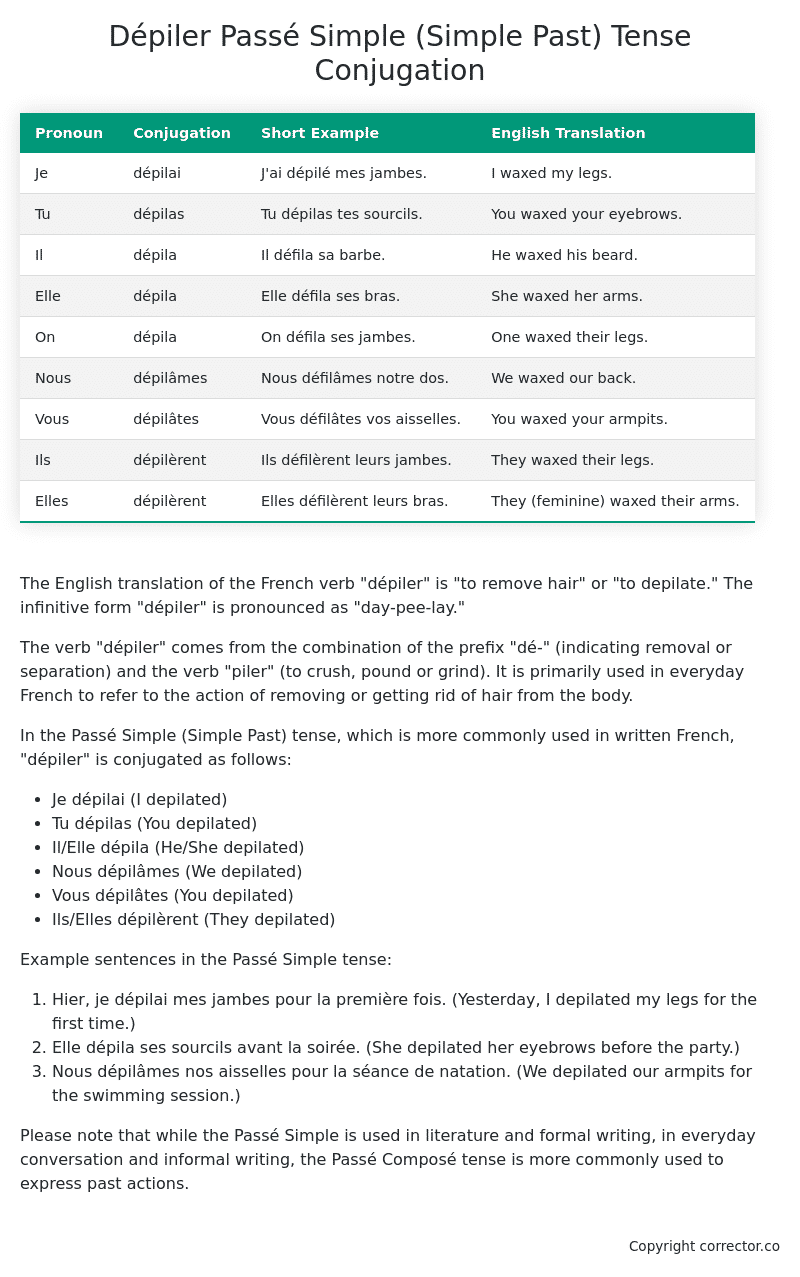Passé Simple (Simple Past) Tense Conjugation of the French Verb dépiler
Introduction to the verb dépiler
The English translation of the French verb “dépiler” is “to remove hair” or “to depilate.” The infinitive form “dépiler” is pronounced as “day-pee-lay.”
The verb “dépiler” comes from the combination of the prefix “dé-” (indicating removal or separation) and the verb “piler” (to crush, pound or grind). It is primarily used in everyday French to refer to the action of removing or getting rid of hair from the body.
In the Passé Simple (Simple Past) tense, which is more commonly used in written French, “dépiler” is conjugated as follows:
- Je dépilai (I depilated)
- Tu dépilas (You depilated)
- Il/Elle dépila (He/She depilated)
- Nous dépilâmes (We depilated)
- Vous dépilâtes (You depilated)
- Ils/Elles dépilèrent (They depilated)
Example sentences in the Passé Simple tense:
- Hier, je dépilai mes jambes pour la première fois. (Yesterday, I depilated my legs for the first time.)
- Elle dépila ses sourcils avant la soirée. (She depilated her eyebrows before the party.)
- Nous dépilâmes nos aisselles pour la séance de natation. (We depilated our armpits for the swimming session.)
Please note that while the Passé Simple is used in literature and formal writing, in everyday conversation and informal writing, the Passé Composé tense is more commonly used to express past actions.
Table of the Passé Simple (Simple Past) Tense Conjugation of dépiler
| Pronoun | Conjugation | Short Example | English Translation |
|---|---|---|---|
| Je | dépilai | J’ai dépilé mes jambes. | I waxed my legs. |
| Tu | dépilas | Tu dépilas tes sourcils. | You waxed your eyebrows. |
| Il | dépila | Il défila sa barbe. | He waxed his beard. |
| Elle | dépila | Elle défila ses bras. | She waxed her arms. |
| On | dépila | On défila ses jambes. | One waxed their legs. |
| Nous | dépilâmes | Nous défilâmes notre dos. | We waxed our back. |
| Vous | dépilâtes | Vous défilâtes vos aisselles. | You waxed your armpits. |
| Ils | dépilèrent | Ils défilèrent leurs jambes. | They waxed their legs. |
| Elles | dépilèrent | Elles défilèrent leurs bras. | They (feminine) waxed their arms. |
Other Conjugations for Dépiler.
Le Present (Present Tense) Conjugation of the French Verb dépiler
Imparfait (Imperfect) Tense Conjugation of the French Verb dépiler
Passé Simple (Simple Past) Tense Conjugation of the French Verb dépiler (You’re reading it right now!)
Passé Composé (Present Perfect) Tense Conjugation of the French Verb dépiler
Futur Simple (Simple Future) Tense Conjugation of the French Verb dépiler
Futur Proche (Near Future) Tense Conjugation of the French Verb dépiler
Plus-que-parfait (Pluperfect) Tense Conjugation of the French Verb dépiler
Passé Antérieur (Past Anterior) Tense Conjugation of the French Verb dépiler
Futur Antérieur (Future Anterior) Tense Conjugation of the French Verb dépiler
Subjonctif Présent (Subjunctive Present) Tense Conjugation of the French Verb dépiler
Subjonctif Passé (Subjunctive Past) Tense Conjugation of the French Verb dépiler
Subjonctif Imparfait (Subjunctive Imperfect) Tense Conjugation of the French Verb dépiler
Subjonctif Plus-que-parfait (Subjunctive Pluperfect) Tense Conjugation of the French Verb dépiler
Conditionnel Présent (Conditional Present) Tense Conjugation of the French Verb dépiler
Conditionnel Passé (Conditional Past) Tense Conjugation of the French Verb dépiler
Conditionnel Passé II (Conditional Past II) Tense Conjugation of the French Verb dépiler
L’impératif Présent (Imperative Present) Tense Conjugation of the French Verb dépiler
L’impératif Passé (Imperative Past) Tense Conjugation of the French Verb dépiler
L’infinitif Présent (Infinitive Present) Tense Conjugation of the French Verb dépiler
L’infinitif Passé (Infinitive Past) Tense Conjugation of the French Verb dépiler
Le Participe Présent (Present Participle) Tense Conjugation of the French Verb dépiler
Le Participe Passé (Past Participle) Tense Conjugation of the French Verb dépiler
Struggling with French verbs or the language in general? Why not use our free French Grammar Checker – no registration required!
Get a FREE Download Study Sheet of this Conjugation 🔥
Simply right click the image below, click “save image” and get your free reference for the dépiler Passé Simple tense conjugation!

Dépiler – About the French Passé Simple (Simple Past) Tense
Formation
Usage
Narration
Historical Context
Interactions with other tenses
Passé Composé
Imparfait
Conditional and Subjunctive
Summary
I hope you enjoyed this article on the verb dépiler. Still in a learning mood? Check out another TOTALLY random French verb conjugation!


